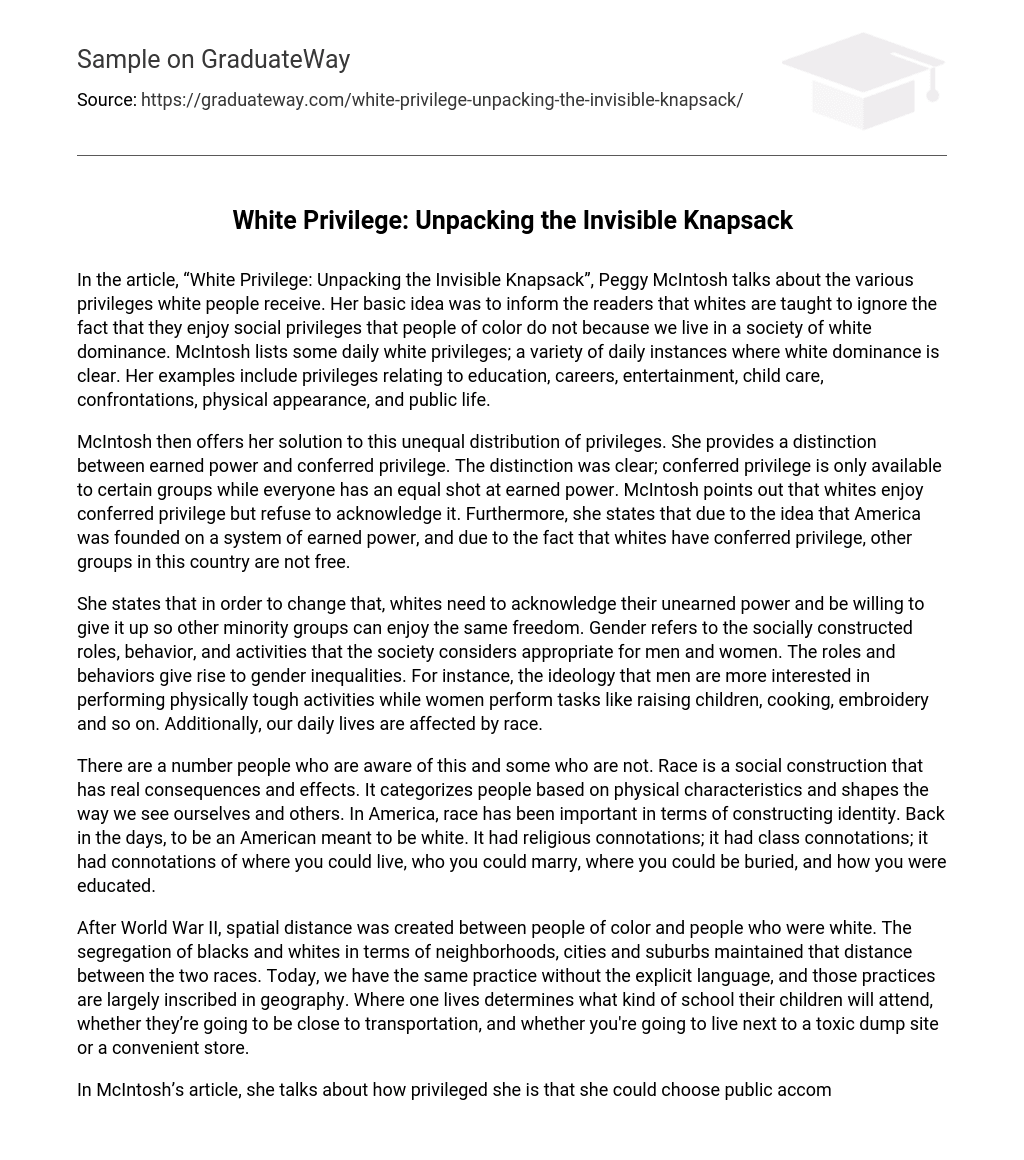In the article, “White Privilege: Unpacking the Invisible Knapsack”, Peggy McIntosh talks about the various privileges white people receive. Her basic idea was to inform the readers that whites are taught to ignore the fact that they enjoy social privileges that people of color do not because we live in a society of white dominance. McIntosh lists some daily white privileges; a variety of daily instances where white dominance is clear. Her examples include privileges relating to education, careers, entertainment, child care, confrontations, physical appearance, and public life.
McIntosh then offers her solution to this unequal distribution of privileges. She provides a distinction between earned power and conferred privilege. The distinction was clear; conferred privilege is only available to certain groups while everyone has an equal shot at earned power. McIntosh points out that whites enjoy conferred privilege but refuse to acknowledge it. Furthermore, she states that due to the idea that America was founded on a system of earned power, and due to the fact that whites have conferred privilege, other groups in this country are not free.
She states that in order to change that, whites need to acknowledge their unearned power and be willing to give it up so other minority groups can enjoy the same freedom. Gender refers to the socially constructed roles, behavior, and activities that the society considers appropriate for men and women. The roles and behaviors give rise to gender inequalities. For instance, the ideology that men are more interested in performing physically tough activities while women perform tasks like raising children, cooking, embroidery and so on. Additionally, our daily lives are affected by race.
There are a number people who are aware of this and some who are not. Race is a social construction that has real consequences and effects. It categorizes people based on physical characteristics and shapes the way we see ourselves and others. In America, race has been important in terms of constructing identity. Back in the days, to be an American meant to be white. It had religious connotations; it had class connotations; it had connotations of where you could live, who you could marry, where you could be buried, and how you were educated.
After World War II, spatial distance was created between people of color and people who were white. The segregation of blacks and whites in terms of neighborhoods, cities and suburbs maintained that distance between the two races. Today, we have the same practice without the explicit language, and those practices are largely inscribed in geography. Where one lives determines what kind of school their children will attend, whether they’re going to be close to transportation, and whether you’re going to live next to a toxic dump site or a convenient store.
In McIntosh’s article, she talks about how privileged she is that she could choose public accommodations without fearing that people of her race cannot get in. She thinks whiteness has protected her from hostility, distress and violence. However, a majority of white Americans believe that in this day and age a black person has the same chance at getting a job as an equally qualified white person. There are a few who believe that discrimination is an important explanation for why blacks do worse than whites in income, housing, and jobs.
For instance, an employer might say that he would “never hire those druggies” as he talks about black men. Discrimination can be considered when thinking about the connection between Muslims living in America and the attack on the World Trade Center. Even during World War II, the USA rounded up all the Japanese-Americans and made them live in internment camps. The people felt discriminated against even though they were innocent. During the late 19th century, it was common to see signs like “Help Wanted: No Irish Need Apply. Even the Jim Crow laws which permitted “Whites Only” signs. Power includes access to social, political, and economic resources. In America, we see males, white, heterosexual, able-bodied, Christian people with more power than the rest. Social institutions like the media, schools and the government reproduce hierarchy and ensure the power is in the hands of the dominant group. For example, more men getting co-operate positions. This is due to the fact that men are more likely to stay in the cooperation longer and are less likely to take a leave to look after a sick child.
Privilege is an invisible package of unearned assets. Dominant groups don’t see privilege as a problem; they don’t even know that the privilege exists. For example, as McIntosh states about white privilege, my children will be given curricular materials that testify to the existence of their race; as well as choosing blemish cover or bandages in “flesh” color and have them more or less match my skin. Having power and privilege allows a person to experience their own perspectives as “normal”.
They don’t have to think about how different their experience would be if they were a woman, a person of color, disabled, or lesbian, gay, bisexual or transgendered. They don’t have to think how their class, gender, or race affects them. Reading McIntosh’s essay, and hearing a white woman’s perspective on this issue has led me to believe that in the last few hundred years women and people of color have “come a long way” in establishing their basic worth and value in modern society. However, in the social order of things, women and people of color are still seen as subordinate.





